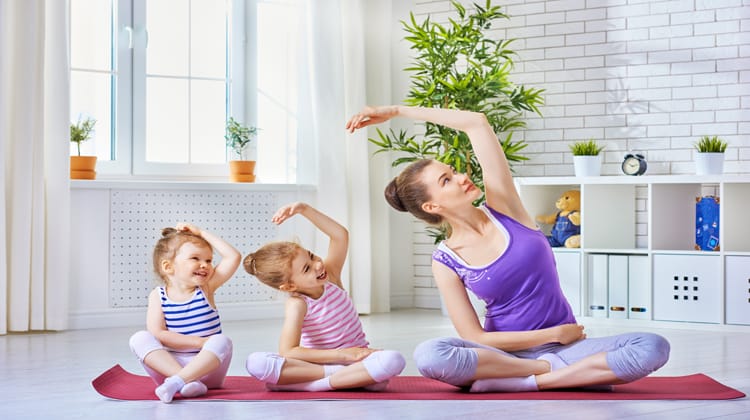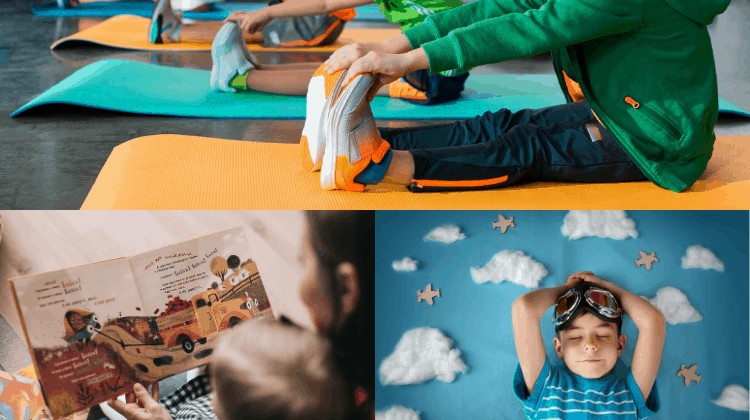THIS POST MAY CONTAIN AFFILIATE LINKS. PLEASE SEE MY DISCLOSURES FOR MORE INFORMATION
It started off as a way to calm my toddler down.
Three years old, with a new baby brother and a fiery temper, she would become frustrated (or over-tired, or bored, or desperate for attention… you know how it goes with toddlers) and positively melt down.
Not a bratty, “I want it my way, mom!” kind of meltdown, but a screaming till her throat was hoarse-sobbing-body flailing- totally out of control kind of melt down.
For my sanity and hers, I needed a way to help us both.
I read parenting books. I talked to my mom, friends with kids, her pediatrician.
We practiced taking deep breaths whenever she seemed on the verge of losing it.
I set aside a special time for simply listening to and playing with her each day, and it helped.
It did.
But there was an underlying anxiety that remained in her, the way she chewed at her lips and bit at her nails, and it was a hard thing to see in a three year old.
That is when I stumbled upon meditating for children and it completely changed everything.
Beginning Meditation With Kids
Meditating With Children: Is It Even Possible?
While as adults we seek out meditation for its calming effects, we can help our children experience the same results when we begin meditating with children.
I had my doubts at first.
Namely, this is a kid we are talking about.
Their attention span is measured in seconds.
If I struggle with meditating as an adult, how is my child going to be able to do it?
And how I am going to teach her?
Through trial and error, we figured it out.
And I am here to help you start meditating with your kids.
Why Is Meditating With Kids Important?
The speed at which our children take in information these days is beyond what most of us thought possible growing up.
That is great but it also takes a toll on a developing mind.
They are simply getting tired and stressed.
While adults are better equipped to deal with forms of stress, children do not have the same set of skills.
Remember, they are still growing and maturing, so even though you can handle stress, they don’t know how to yet.
This is especially true if they have not been taught coping mechanisms.
Dealing with emotions is not something they learn much about in school, but we can teach them at home.
This is where mediation comes in.
Meditation is a great way to really tap into and feel the emotions that we have.
It is also a great way to work through them and eventually learn how to have control over them.
Benefits Of Children’s Meditation
If you are still on the fence when it comes to the benefits meditation has on kids, here is a quick rundown.
- Clear thinking
- Relaxed state
- Increased creativity
- Reduced stress
- Balanced emotions
- Easier decision-making
- Inner happiness
- Increased concentration
- Improved sleep
While you won’t see these improvements overnight, they will start to show up a lot faster than you think.
I’ve seen kids become more relaxed and sleep better within a week’s time.
And this snowballs into better behaved kids during the day, which then leads to being more relaxed, making better decisions and an overall improvement in their daily life.
By teaching your kids the tricks of taking a focused breath and a quick visualization of a happy place, they can learn how to relieve panic or nervousness instantly.
And the good news is there are techniques you can use, like guided meditation, that makes learning this new skill easier for them.
Children’s Meditation Techniques
When it comes to being successfully at meditating with kids, know there is no one size fits all approach.
As a parent, you probably already know this.
Every child is unique, so you need options.
Below I share with you a handful of children’s mediation ideas to get you started.
Daily Meditation
While this isn’t technically a technique, it is a reminder of when you can use guided meditations with your child.
For example, at home when they are stressed with their homework, you can help them with meditation.
Maybe they are having a difficult time with a friend and feel sad or angry. You can help them with that as well.
You can also spend some teaching them how to do meditations when they are away from home.
By doing this, they learn how to use meditation to control their state anywhere.
This will be helpful for the rest of their life.
Taking a few deep breaths before answering a teacher’s question is a great form of meditation that is not obvious to everyone and has a great impact.
The Meditating Game
This is simply slowly reading a story in a soft voice and practicing taking deep breaths.
This was our first attempt at meditating.
It was probably the goofiest, most un-meditative meditation session ever, but it was fun to put my child down for nap and play a “meditating game” with her.
She fidgeted, she giggled, she flopped over, but as I read slowly and calmly from the pages, she began to relax.
Her breathing slowed.
A slow smile crept over her face.
When I finished reading, we sat taking deep breaths and after she opened her eyes, she proceeded to stretch out her limbs on the bed, before telling me she had fun and bounding off to her room.
She doesn’t always want to play “the meditating game” and I certainly don’t force it.
I have noticed that when we do meditate for a few days in a row, she seems happier, more at ease, and less clingy.
Children’s Meditation Stories
Younger children in particular, can benefit from meditation stories.
These are available in regular and audio books as well as videos.
They walk the children through meditation with a story so that it feels familiar and is easy for them to enjoy.
Here is my favorite one on Amazon.
The pictures in the stories are meant to help children visualize calm and peaceful states of being.
These are awesome tools for beginning mediation with little ones.
Short Meditations For Kids
Meditating with children for even several minutes in a day can be helpful for their body to relax and their mind to clear.
It does not need to be sitting silently to count as meditation.
It is difficult for kids to sit still for a long time, but they can put their focus on something longer if they are interested.
Think of meditation as focusing and it will be easier to come up with new ways to show your kids how to meditate.
Some ideas to get you started include listening to and repeating a repetitive sound, singing a calm song, or deep breathing.
One very popular short meditation includes breathing in for a count of six while visualizing plus signs going into the body through the nose.
Then breathe out for a count of six while visualizing minus signs going out of the mouth.
For a younger child who is not yet familiar with plus and minus signs, any symbols that represent positive and negative to them will do.
A simple one is using the smiling sun as the positive and a grumpy storm cloud as the negative.
Another short meditation that works well is to imagine the whole body filling up with light when taking a deep breath.
Tell them to feel the warm glow of the light. Explain to them that peace and happiness are associated with light.
Once they know and begin to practice this, they will be able to easily fill themselves with positivity.
Guided Mediation For Kid’s Sleep
Meditation before sleeping is a great way to calm the mind of any worries and get a good night’s sleep.
You can guide your child through a meditation by having them pretend to be floating in a boat or sitting in the sun.
Describe for them all the things they may see, feel, or smell while they lay with their eyes closed.
They will imagine what you are telling them and will often drift off into sleep.
If your child is the adventurous type who would want to keep adding to that story, then that would be great for a bedtime story but not for meditation.
For that child, perhaps a soothing song would be better.
There are also many online audio and video guided meditations that you can use with your children.
However, often the soothing sound of their mom or dad’s voice helps the body and mind to calm more quickly.
You can always get the ideas from apps or sites and then adapt them to use with your voice too.
Try some different things out and find out what works best for your child.
Mediation Scripts For Kids
Meditation scripts are a great way for you to introduce meditation to your child.
They are written for you to read to your child so that you are guiding them through their meditation.
As mentioned above, the sound of your voice may be more soothing to them than someone else’s.
This is also gives you some one-on-one time with your child.
There are numerous resources available through a quick internet search for you to find.
Some are free and others have charge a fee.
Children’s Guided Meditation
Any time that someone else is leading someone through meditation, it is called guided meditation.
This can come in the form of audio or visual.
Most often audio versions of guided meditation work best because many kids can focus better with their eyes closed.
Some need to see what they are hearing though in order to process it, so be sure to try both with your child to see which works best for them.
Morning Meditation For Kids
Starting off the day meditating with your kids can be very beneficial to both of you.
For some families, this may mean saying a prayer together.
For others, it may be deep breathing followed by some chanting of a morning mantra such as “today will be a wonderful day”.
Perhaps you will share a guided meditation video with your child.
There are so many ways to prepare them for the day ahead with morning meditation.
If they are having a particular event that day that they are nervous about, such as a speech, then prepare them for that.
Guide them through visualizing being in front of the class and having a feeling of total preparation and confidence.
Have them feel themselves sitting back down in their chair after they are done with a sense of accomplishment.
This helps to program their mindset for success before beginning their day.
Guided Meditation For Students
Many schools are beginning to use guided meditation as part of a daily practice.
This can help students in so many ways from dealing with ordinary test stress to dealing with stage fright when giving a speech.
If your child’s school does not currently practice meditation with their students, then you can have them do a guided meditation before school.
There are many available online in different forms from apps to videos.
A simple search will return many results and help you narrow in on the best type for your child.
Frequently Asked Questions
I get asked a lot about guided meditation with kids and mediation in general.
Here are the most common questions and answers.
How long should kids meditate?
This will depend on your child and their age.
The general guideline is up to a 10 minute session, twice a day for kids under 13.
For teens, up to 45 once a day is appropriate.
Of course, if your child loves to mediate, and can go longer than the recommended time, there is no harm in extending the time a little bit.
Additionally, when just starting out, know that you should be aiming for a shorter amount of time and building up as the week’s progress.
How do I teach my toddler mindfulness?
When it comes to mindfulness and toddlers, know that the less rigid you are the better.
Toddlers will respond better to being silly and having fun rather than being serious.
For starters, you can let your toddler watch you practice mindfulness.
At first they won’t understand, but as they take an interest, you can begin to teach them habits and techniques.
Another option is to use what your kids love.
For example, use their favorite character as a prop.
Minnie Mouse could work on her stretching or taking deep breaths.
And speaking of deep breaths, using breathing buddies is another great option.
What is the best guided meditation for kids sleep?
This will depend on your child.
Some prefer to have stories and books read, which I cover below.
Others like music, while others prefer stretching and deep breathing.
What are the best children’s mediation stories?
As I mentioned before, not all stories will work for everyone.
But there are a small handful that most people find make a difference.
- I Am Peace (this is a great series of books)
- A Handful Of Quiet
- Breathe Like A Bear
- Bedtime Meditations For Kids
And here is a bonus tip.
Consider trying out the audio book versions as well.
While many kids love the sound of their parent’s voices reading to them, a professionally read book in a soothing voice can work even better.
If you want to go this route, here is a free 30 day trial to Audible. You also get 2 free books during your trial as well!
What are some mindfulness exercises?
Here are a few ideas to get you started with mindfulness exercises.
- Ring a bell or a chime. Then focus on listening to the sound until you can no longer hear it.
- Practice with smell. Have your child close their eyes and present a smell to them, like an orange. Then have them tell you about what they smell in detail.
- Muscle relaxation. Practice with your child relaxing and flexing certain muscles for a period of time.
What are some mindfulness activities?
The more fun you make mindfulness activities the better.
My favorite is the weather report.
Here, have your child tell you how they are feeling using weather words.
For example, if they are angry, they might say thunderstorm. Happy, and they might say sunny.
Another activity is to take a walk.
Only this time you notice things you never saw before on your walk.
Does mindfulness work for anxiety?
Yes!
Mindfulness is a great way for kids to reduce anxiety.
Many times their anxiety comes from thinking about the future and trying comprehend it all.
By helping them to learn to be more present, you can relieve some of their anxiety.
Final Thoughts
The benefits that your children will gain for the mind, body and soul through meditation are numerous.
As they continue to practice meditation, they will grow into confident, well-prepared, balanced and creative adults.
They will learn how to cope with stress before it happens and as it is happening rather than trying to cope with the aftermath that it causes.
Perhaps best of all, your child will connect with you in a way that many never do connect with their parents.
They will be thankful for the coping mechanisms that you provide them and will carry them with them for the rest of their life.
Please take some time to peruse the many options available for meditation and try some with your children.
You and your children will be forever grateful.

Jon Dulin is the passionate leader of Unfinished Success, a personal development website that inspires people to take control of their own lives and reach their full potential. His commitment to helping others achieve greatness shines through in everything he does. He’s an unstoppable force with lots of wisdom, creativity, and enthusiasm – all focused on helping others build a better future. Jon enjoys writing articles about productivity, goal setting, self-development, and mindset. He also uses quotes and affirmations to help motivate and inspire himself. You can learn more about him on his About page.




